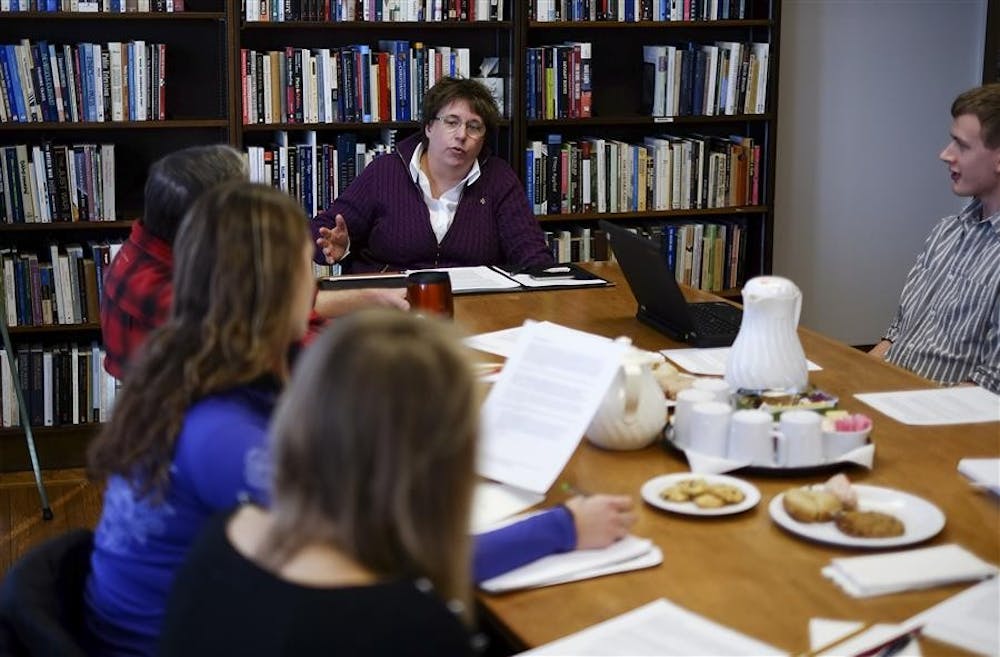In lieu of a new digital age of media distribution, governments on a national and global level have been searching for the answers on how to address copyright laws and digital media availability.
Kelley School of Business Professor of Business Law and Ethics Anjanette Raymond led a discussion at the Poynter Center Tuesday, during which the group addressed piracy in a digital age, personal privacy online and what actions could be taken in order to address these issues in the coming years.
Poynter Center employee Emma Young said one of the main questions was how society defines ownership on a digital level.
“It seems like part of the question is, what is the model of ownership that we are using for files?,” Young said. “A lot of ownership is actually the right to market
something.”
There is currently a gray area over whether ownership in the digital world is the same as in the physical world.
In the physical world, the person who creates something gets paid for their product, but then the person who purchases it owns and can manipulate the product, Young said.
Sophomore Ellie Bennett and other students in attendance said though most people are willing to purchase the media they are using, it is simply faster and easier to find something on the Internet than it is to find somewhere to purchase it.
Bennett said it is more about the convenience of the technology than it is about the illegality of the act.
Companies aren’t actually losing money to the Millenial Generation, Raymond said, because they are willing to pay full price for things.
Along with the piracy debate, the group also questioned whether or not the privacy of Internet users would be infringed upon because of the need to monitor illegal activity.
“As more and more people infringe on the piracy debate ... we are forcing providers to begin to monitor us at a higher level,” Raymond said.
Sophomore Caley Mintz questioned how much privacy people have on the Internet, or if they actually waive their rights to privacy by using Internet services.
Young questioned whether it is fair to surrender all privacy to use certain products.
In efforts to shut down piracy websites, such as Megaupload.com, which was shut down on Jan. 19, 2012, governments ran into the issue of new websites replacing the old ones as they were taken down. There is no way for people to keep up with the new websites as they are created because they are so difficult to trace, Raymond said.
“Where is this?” Raymond said. “It’s nowhere, it’s everywhere. It’s the cloud.”
The original producer has a profit motive, sophomore Daniel Eads said.
“Without the profit motive there, those services could go away,” he said.
Video game companies have considered requiring games be installed to their consoles in order to play them instead of allowing them to be played online and potentially shared, ensuring that the games could not be shared, but the unpopularity of the idea kept it from being a part of latest editions such as the Xbox One.
Companies have also threatened to release the names of those caught illegally downloading and sharing information.
The group discussed how the next generation of employers would also come from a world where very few things are private. Therefore, they may very well be more lenient in that kind of a situation in the future.
“There are bigger problems in our society today than illegally downloading things,” Mintz said.
Students said with all the other issues that the government is forced to deal with, there is little time left to spend on things like illegal downloads.
“We need to police the Internet ourselves,” Raymond said.
He said individuals can do their part to prevent further government involvement online.
“We need to get into the digital age,” Raymond said. “I’m with you.”
Follow reporter
Amanda Marino on Twitter
@amandanmarino.
Kelley professor discusses piracy ethics

Get stories like this in your inbox
Subscribe





